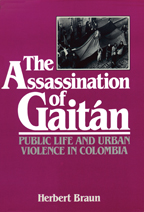The
Assassination of Gaitán
Public Life and Urban
Violence in Colombia
Herbert Braun
On April 9, 1948, Jorge Eliécer Gaitán, then
a popular political leader likely to become the next president
of Colombia, was shot and killed by a drifter whose motivations
remain obscure. Gaitán's death touched off a spontaneous
riot, known as the Bogotazo, and left hundreds dead, razed
the center of Bogotá and had far reaching consequences.
Drawn in part from personal interviews
with participants and witnesses, Herbert Braun's analysis of
the riot's roots, its patterns and consequences, provides a dramatic
account of this historic turning point and an illuminating look
at the making of modern Colombia.
Braun's narrative begins in the year 1930 in Bogotá, Colombia,
when a generation of Liberals and Conservatives came to power
convinced they could keep the peace by being distant, dispassionate,
and rational. One of these politicians, Jorge Eliécer
Gaitán, was different. Seeking to bring about a society
of merit, mass participation, and individualism, he exposed the
private interests of the reigning politicians and engendered
a passionate relationship with his followers. His assassination
called forth urban crowds that sought to destroy every visible
evidence of public authority of a society they felt no longer
had the moral right to exist.
This is a book about behavior in public: how the actors—the
political elite, Gaitán, and the crowds—explained
and conducted themselves in public, what they said and felt,
and what they sought to preserve or destroy, is the evidence
on which Braun draws to explain the conflicts contained in Colombian
history. The author demonstrates that the political culture that
was emerging through these tensions offered the hope of a peaceful
transition to a more open, participatory, and democratic society.
"Most Colombians regard Jorge Eliécer Gaitán
as a pivotal figure in their nation's history, whose assassination
on April 9, 1948, irrevocably changed the course of events in
the twentieth century. . . . As biography, social history, and
political analysis, Braun's book is a tour de force."—Jane
M. Rausch, Hispanic American Historical Review
From the author's preface
"Year after year a story is told in
Bogotá and throughout Colombia. It recounts the life of
one man and the experiences of those who lived through the day
of his death. So much has been added to and taken from the story
that it now has a fictional, almost fantastic, character.
I have sought to recover an assassination in Bogotá for
history, and present it as part of a secular process so that
we may build upon the past.
Colombia is best known in the United States through the fantastic
literature of Gabriel García Márquez as a distant
world doomed to cyclical devastation. I hope that this story
of civilian politics and urban violence will help to dispel some
of the myths, and that the reader will come to appreciate the
search for order, the love of laws, the depth of convictions,
and the strength of collective purpose which characterize the
conflicts that make for historical change in Colombia."
Herbert Braun is assistant
professor of history at the University of Virginia. Born in Bogotá,
Colombia, he has also taught at the Colegio de México
in Mexico City.

A trade imprint of the University of Wisconsin Press
Media & bookseller inquiries regarding review copies, events, and interviews can be directed to the publicity department at publicity@wwwtest.uwpress.wisc.edu or (608) 263-0734. (If you want to examine a book for possible course use, please see our Course Books page. If you want to examine a book for possible rights licensing, please see Rights & Permissions.)
|
|

March 1986
LC: 85-040362 F
320 pp. 6 x 9
16 illus., 9 maps
|

